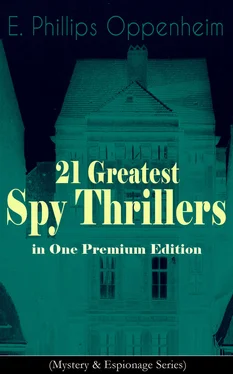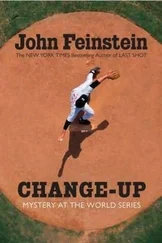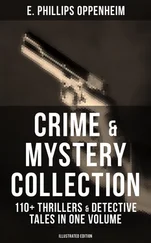“How badly are you hurt, I wonder?”
“I am not hurt much,” Fritz replied. “A bruised leg that will make me limp for a few days—that is all.”
“You have given us matter for thought,” Charles declared, after a brief silence. “Go and sit in your taxicab and read the news, but be sure to keep your car out of sight.”
Fritz took his usual respectful leave.
“Good thing this didn’t happen before,” Charles observed, as soon as the door was closed. “Now tell me, Blute, are there any houses about on the other side of the lane?”
“There couldn’t be a lonelier spot than the district around that extraordinary building,” Blute confided. “Mr. Benjamin refused to sell a yard of the land anywhere near the palace, fortunately.”
Charles drew a sigh of relief.
“Then for a short time,” he proposed, “let us leave the disposal of the dead Gestapo for further consideration. We ought to go right on with the general scheme.”
Patricia looked up from her desk.
“I quite agree,” she said. “I think the next thing we ought to consider is making arrangements for the guards who are travelling with the caskets.”
“Even before that,” Blute suggested, “we must make sure first of securing the van.”
“Where will you make for first when you have crossed the frontier?” asked Charles, studying the map.
“Once in Switzerland,” Blute answered, “I think we might pause and try to find out Mr. Benjamin’s whereabouts. By then I imagine we shall be getting to the end of these heaven-sent resources of yours, Mr. Mildenhall.”
Charles acquiesced.
“It seems a queer thing to me,” he reflected, “that Mr. Benjamin should have succeeded in disappearing so completely.”
“He has disappeared because he is the wisest and most sagacious man I ever met,” Marius Blute said emphatically. “No possible inducement ever succeeded in leading him to commit himself politically in any way. His whole life was an enigma to the Nazis. All that they knew was that long before they were sure of getting hold of Austria he was working like an alchemist getting rid of his fortune and his investments and distributing them all over the world. I know because it was I who was doing it for him, and their agents were on my track every day.”
Charles sauntered to the window and looked across once more at the church clock.
“I suppose you’d think I was mad, Blute, if I suggested that Miss Grey and I take a little stroll,” he remarked.
Blute’s expression for a moment was almost savage. He was, without a doubt, angry.
“In forty-eight hours,” he said, speaking very slowly and very distinctly, “we may be absolutely free to do exactly what we like, we may be in a fortress, we may be dead or we may have brought off one of the most amazing coups the secret service of the lay world has ever known. The greatest danger we have to face is association of the one with the other. How you, Mr. Charles Mildenhall, whom I should call the directing brains of the enterprise, can suggest that in this spot, which is the very centre of Nazi espionage, you and Miss Grey—who is well known as having been the private secretary of Mr. Benjamin—should be seen together in friendly conversation, defeats me.”
“I sit in sackcloth and ashes,” Charles repented. “Blute, I’m afraid you are right.”
“In your salon here,” Blute continued, “with access to the back service stairs, we have a sanctuary. I have a room leading out to the fire escape which I shall use instead of the stairs or lift if I think it advisable. Miss Grey here mingles with the servants and the hired help of the establishment. You, Mr. Mildenhall, make no attempt at concealment. You are the wealthy and distinguished patron of the hotel. If we should by any evil chance come face to face at any time there must not be the slightest suggestion of recognition.”
“I absolutely agree with Mr. Blute,” Patricia said earnestly. “You are running great and unnecessary risks for our sakes, Charles. I would never forgive myself if anything happened in these last few hours, nor, I am sure, would Mr. Blute.”
“If I might make a suggestion,” Blute said, “I think that a stroll across the square and a half-hour on view alone, Mr. Mildenhall, would be an excellent idea. I hope, too, that you will show yourself in the bar and restaurant here as usual on every opportunity. You are a well-known figure in Vienna when you pass through and people might very well wonder where you had spent your time here if you are not visible at any of the show places.”
“I am crushed,” Charles acknowledged. “I will swagger about the place presently and leave you two to go your own way for a time. If you want me, telephone to Herodin. I’ll leave word where I am. Don’t stint the ‘quiet money,’ Blute. Remember that an odd fifty pounds here and there may make all the difference.”
“You’ve been setting us a pretty good example of spending money,” Patricia observed, leaning forward to sniff at the bowl of roses upon the table.
“Roses in Vienna are like cabbages in White-chapel,” he answered. “You find them wherever you go.”
Once more a knock at the door. Joseph made his reappearance, calm but triumphant.
“ Mein Herr ,” he said, addressing Charles, “I have succeeded, but I have bought the railway! At least, so it seems to me—a poor man. I have arranged for the van, I have arranged that it shall be attached to the eight o’clock train to-morrow morning on one condition—that whatever you are sending in it shall be in the yard before midnight. It is yard number seven, to be reached from the Weltenstrasse.”
Patricia leaned back and clapped her hands.
“That is precisely what we were hoping for!” she exclaimed. “Not ten minutes ago. Monsieur Joseph, we were saying that it would be a great deal off our minds if we could get the van linked up tonight.”
“It is arranged,” Joseph announced. “To tell you the truth, Fräulein , the guard is waiting outside. With him, too, the preliminaries have been broached. He has consented to help in your scheme. I must warn you, Herr Mildenhall, that you will now have to face a shock.”
He handed over a slip of paper.
“For that I have bought the railway,” he murmured.
Charles glanced at the amount and smiled.
“It is an amazing feat, Joseph,” he declared. “On the other hand it is an absurdity. You have bought the railway, perhaps, for our interests, but for yourself, your wife, your children, your son’s wife—what remains? Nothing. Patricia, you must see to this. Joseph is robbing himself. You will provide him at once with another thousand reichsmarks.”
Joseph’s bow was equal to the bow of any courtier who had ever entered the royal palace.
“Monsieur is a Prince!”
“Bring in your guard,” Charles begged. “I am being dismissed from this assembly, Joseph, just when I am getting a little fun out of it. Bring in your guard that I may deal with him. And wait,” he went on, laying his hand upon the man’s shoulder, “when you come to fetch him away see that you are accompanied by Frederick, the second barman in the American Bar. See that he brings with him four carefully mixed dry Martinis still in the shaker with the ice just dropped in, also four glasses. And Joseph, see that the glasses are not too small. Frederick himself calls them doubles, I believe.”
“ Der gnãdiger Herr shall be obeyed,” Joseph murmured. “I fetch now the guard. Afterwards I shall send word to Frederick.”
He disappeared for a moment and returned ushering in a stalwart-looking elderly official in the uniform of the Austrian Railway Company. The newcomer carried himself in soldierly fashion. His grey hair was neatly parted, he wore a closely clipped grey beard and he had more the appearance of a gentleman farmer than a railway official. He carried his cap in his hand. He bowed to Patricia, he smiled in more familiar fashion to Mr. Blute and he bowed respectfully to Charles. He nodded a temporary farewell to Joseph, who disappeared.
Читать дальше












